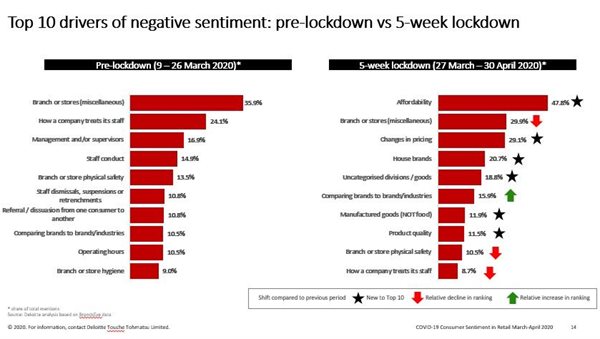The report collected 552,927 social media mentions, of which 123,914 pertained to Covid-19 in the period before (9 - 26 March) and during (27 March - 30 April) the national lockdown. Just over 77,680 mentions were processed by BrandsEye’s Crowd of human verifiers for sentiment analysis.
Consumers on the lookout for good governance
Consumer sentiment and priorities have shifted over time. Sentiment towards retailers has worsened over time from -8.3% to -13.3%. Prior to lockdown, concerns centred around in-store health and safety measures.
After these measures were adopted, they were welcomed but once the lockdown began consumers shifted concerns towards pricing and paid close attention to how retailers were treating their staff. Those retailers who implemented relief and other measures to protect staff saw higher levels of positive sentiment.
BrandsEye CEO, Nic Ray noted that “there has been a heightened sense of consumer awareness about retailers’ conduct in the market. This trend presents a new reputational risk that demands retailers keep their finger on the pulse of consumer sentiments. Consumers feel empowered to voice their concerns online and are taking note about which organisations are adopting new CSI initiatives, implementing measures to protect staff health and income, and which executives have taken pay cuts.”
“The growth in online conversation, particularly as people spend more time on digital channels, also presents an opportunity for retailers to boost service on these channels and alleviate the increased demands their agents face in-store and at call centres,” added Ray.
According to Rodger George, consumer services leader, Deloitte Africa, “Retailers should take advantage of new learnt behaviour through the Covid-19 crisis. Lessons learnt through the transformation of supply chains, the creation of stronger links between physical and online channels, staying true to brand purpose and focusing fanatically on customer loyalty, are some of the key factors that must be hard-wired into the upgraded DNA of the new retail organisation.”
Michaela Gabriel 28 Apr 2020 Successful retailers are integrating technology into their operating and customer models in a way that drives a consistently customer-centered approach. Building trust with consumers is perhaps more important today than ever before and retailers can benefit from responding to customer needs or complaints quickly and effectively.
“Tough economic times make it difficult for retailers to offer a unique customer experience but it’s simply not worth it to trade this and customer loyalty off for short-term financial gains,” he adds.
Recalibration of CX
In uncertain times CX is a key differentiator. Customers responded favourably to in-store experiences that ensured social distancing and safety measures for both staff and customers. The retailers that delivered effective online sales also generated positive feedback.
Supply chain and category management must evolve
Rapidly changing consumer demands and market context require different approaches to supply chain and category management. Customers are increasingly sensitive to pricing, stock levels, product choices and where their products and produce comes from. They also demand convenience, like delivery services. Leveraging these demands will be a key differentiator.
Health and hygiene is the new normal
Consumers have become very conscious of personal hygiene. Prior to the lockdown, this was the chief concern of customers. Retailers will need to monitor this conversation to ensure they continue to meet consumer expectations and government regulations as lockdown restrictions ease.
Consumers welcomed and referenced specific retailers’ safety measures that they felt were extra stringent. This offers a new area for differentiation in the market.
Employees are more important than ever
Consumers are increasingly concerned with retailers' treatment of staff and expect them to protect and care for their employees. Employee experience directly influences customer experience, and initiatives geared towards employee wellbeing have had positive impacts on market sentiment and brand reputation for retailers.
Customer-centricity requires listening in real-time
The Covid-19 crisis demands that retailers pay close attention to the valuable feedback that consumers volunteer on digital channels. Analysed at scale, this data provides important insights to benchmark performance in the market and assess the success of interventions such as new hygiene measures and changes to pricing.
Retailers that ignore this feedback risk significant damage to customer loyalty and reputation, noted Deloitte and Brandseye.











































